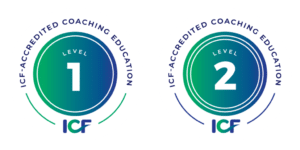We may receive compensation if you visit partners we recommend. Read our affiliate disclosure.
In this complete guide, you’ll discover why it’s so beneficial for life coaches to gain a coaching certification accredited by the International Coach Federation (ICF).
A training program accredited by the International Coach Federation will serve you best if you’re serious about pursuing a professional coaching career.
Also, check out my guide about the Best ICF Approved Life Coach Certification Programs.
Let’s dive right into it.
Key Takeaways:
- The International Coach Federation (ICF) is widely regarded as the body that sets the strictest standards for life coach accreditation.
- The ICF Code Of Ethics and ICF Core Coaching Competencies are documents that all life coaches should understand and abide by.
- An ICF-accredited certification will make it far easier for you to launch a successful coaching practice and attract an abundance of life coaching clients.
What Is The International Coach Federation (ICF)?
The International Coach Federation is the standard governing body for coaches around the world. It has existed since 1995 and is the most recognized and reputable certificate for coaches.
It sets the standards for life coach training, evaluates coaching programs to ensure they meet these standards, and awards accreditations to those that do.
ICF Highest Standards For Coaching
The ICF is widely credited for providing the highest standards of coaching. This is largely based on two sets of standards in particular.
ICF Code of Ethics
The ICF Code of Ethics is based on the ICF Core Values (Integrity, Excellence, Collaboration and Respect) and the actions that flow from these. Essentially, this document outlines the standards that ICF-accredited coaches should aspire to meet throughout all their interactions.
ICF Core Coaching Competencies
This is the list of skills and abilities that an ICF accredited coach is expected to master. It’s a highly detailed document that is available online, thus giving students a solid idea of the curriculum they will study within their life coach training program. The ethical guidelines within the Code of Ethics are included with this list of core competencies.
There are easier and cheaper ways to become “certified” as a professional coach, but these certifications won’t impress clients nearly as much. If a coach is committed, intelligent and skilled enough to complete an ICF-accredited course, this signals they are more than qualified enough to help a client in any scenario.
Getting an ICF credential isn’t easy – and that’s precisely why it’s so valuable and respected.
When Do You Need A Coaching Program And Certification?
Life coaching is an unregulated industry, which means that anyone can technically set up a website and market themselves as a professional coach, regardless of whether they have received ICF credentialing.
However, if you’re serious about pursuing a professional coaching career, it’s strongly recommended that you invest in accredited coaching training.
After all, you will be competing for business against thousands of professional coaches who do have an ICF credential – and any potential clients who spend a couple of minutes researching how to choose a good coach will know to look for this.
Even if you do somehow convince a client to pay you for coaching, you will struggle to give them adequate professional experience if you have little to no knowledge of basic coaching competencies.
To summarise, you should pursue ICF credentialing if:
- You are just beginning a professional life coaching career
- You aren’t aware of how the human mind works
You may be able to skip this training if:
- You are already coaching
- You already have enough experience and clients
6 Skills You Should Have As A Professional Life Coach
An ICF-accredited coaching certification will help you gain all the skills you need to make it as a professional coach.
You’ll learn all the ins and outs of coaching people and helping them towards their goals.
However, there are other skills you may already possess that will help you reach mastery in your professional coaching career.
These include:
Compassion
It is a life coach’s job to listen to other people’s problems. Without compassion, it’ll be near-on impossible to enjoy this job or excel in it. It will also be hard to build a meaningful connection with your clients. It is extremely difficult to successfully fake compassion. However, this is a personal quality that can be cultivated.
People skills
You’ll need people skills in order to convince anyone to sign up for your life coaching services. Humans make decisions based on emotions, rather than logic. So, it’ll be very rare that anyone decides to purchase coaching from you if they don’t like or trust you.
Problem-solving
Life coaching is a career where there is rarely one right way of doing things. Instead, the correct path forward will depend on the individual you are working with and their specific situation. To thrive in a life coaching career, you will need to enjoy solving complex problems and be open-minded enough to excel at this.
Creativity
Creativity is needed because there is no one way to make a breakthrough with a life-coaching client. Humans are complex individuals. A creative and open-minded professional coach will be able to think outside the box to give their client what they need in order to progress.
Goal-setting
Goal-setting plays a major role in life coaching. However, this isn’t just about setting SMART goals for your clients and making sure they stick to them. You need to learn how to set goals that align with a client’s values and inspire them instead of intimidating them. This vital skill will be taught within any good life coaching certification.
Progress management
Progress management is the process of ensuring that you and others continue moving towards their goals. It involves motivation, organization, critical thinking, and communication skills.
An ICF-accredited coaching certification will teach you various methods to enhance these skills. Yet, it may be that you are already accomplished in one or several of these areas. If that is the case, I would suggest you’re highly likely to enjoy a life coaching career and flourish in it.
How To Become An ICF Accredited Coach
Step 1. Certification By A Company
There are a lot of training programs out there for life coaches.
It’s highly recommended to choose a training program accredited by the ICF. For more guidance, check out my list of the best ICF-accredited life coaching certifications.
After finishing an educational program you will be awarded a certificate by the company you choose.
At this point, you can market yourself as a ‘certified coach’ in whatever field the training course was based on:
Some options include:
- Life Coach;
- Transformational Coach;
- NLP Master Practitioner;
- NLP Life Coach.
How To Find ICF-Accredited Coaching Programs
The ICF offers Training Program Search Services (TPSS) – a directory with all accredited educational programs. This is the simplest way to find life coach training to suit your needs.
There are 3 different types of training programs defined by the ICF.

These are:
- Level 1 (old: Approved Coach Specific Training Hours (ACSTH))
An ICF Level 1 (old: ACSTH) is considered an all-inclusive professional coach training program. An Level 1 includes a minimum of 60 hours of coach-specific training, including comprehensive instruction around the ICF Core Competencies, Code of Ethics and the ICF definition of coaching. This type of program also includes Mentor Coaching, observed coaching sessions, and a comprehensive final exam that evaluates a student’s coaching competency. - Level 2 (old: Accredited Coach Training Program (ACTP))
Level 2 accreditation is for at least 125 and up to 175 contact learning hours, and is designated as PCC Accredited Education. - Level 3
Level 3 accreditation is for 75 contact learning hours and is designated as MCC Accredited Education.
Graduates from a Level 3 education and training program may apply for the Master Certified Coach (MCC) Credential using the MCC application path if they meet the credentialing application requirements.
Continuing Coach Education (CCE)
A CCE program is intended for coaches who already have ICF Credentials or who have completed basic coach training. A CCE program may include advanced coach training that directly relates to or expands upon the ICF Core Competencies, and/or training in skills that contribute to the professional development of a coach (e.g. personal development, coaching assessments or tools, business building, or other material that falls outside of the ICF Core Competencies.)

Step 2. Applying For Accreditation At The Professional Body ICF
The second step to becoming an ICF-accredited coach is to apply directly to the ICF for accreditation.
You can only do this after you’ve received a certificate from an ICF-accredited coach training provider.
There is no extra work needed at your end, but the accreditation will cost you a one-off fee. ICF members get a significant discount.
There will be a significant waiting period while the ICF reviews your credentials, but once they confirm your accreditation, you can officially market yourself as an ICF-accredited coach. This should do a lot for the overall success of your coaching business.
There are three types of ICF credentials you can apply for: Associate Certified Coach, Professional Certified Coach, and Master Certified Coach.
- Associate Certified Coach (ACC)
- 60+ hours of coach training to apply
- 100+ hours coaching experience
- $100 for ICF members or $300 for non-members
- An estimated four weeks to review
- Professional Certified Coach (PCC)
- 125+ hours of coach training to apply
- 500+ hours coaching experience
- $300 for ICF members or $500 for non-members
- An estimated four weeks to review
- Master Certified Coach (MCC)
- 200+ hours of coach training to apply
- 2,500+ hours coaching experience
- $575 for ICF members or $775 for non-members
- An estimated 18 weeks to review
Additionally, you need to gain 10 hours of feedback (mentor coaching) with a qualified mentor coach for each ICF credential. These all need to have taken place within a three-month period. The mentor coach must also have an equal or higher certification than the one you’re applying for.
ICF 3 Essential Practices for Effective Coaching Training
These are the three essential practices that need to take place during your life coach training in order for it to be accredited by the ICF.
Live instruction
To become an effective professional, your training must involve ‘live’ instruction, where the instructor and student can communicate in real-time. If your curriculum is only taught through books or pre-recorded videos, it won’t be accredited by the ICF. The ICF will also evaluate the credentials of the instructor(s) themselves when evaluating the training course.
Live practice
In order to be accredited by the ICF, a significant portion of your training should involve students practicing the skills they are taught. You shouldn’t just be talking, but also doing. After all, this is the best way to ensure lessons stick in our brain. This practice should take place with actual clients, as well as with instructors and other students.
Live feedback
Practice doesn’t make perfect if you’re practicing badly. That’s why all ICF-accredited training programs require students to receive live feedback from a mentor coach.
Related: (BCC) Board Certified Coach Vs. ICF – Complete Guide
ICF Credential Renewal
In order to ensure an ICF-accredited coach maintains the highest standards of coaching, the body requires all credentials to be renewed every three years.
In order to successfully renew your ICF credential, you’ll need to have completed another 10 hours of mentor coaching since receiving it. Again, these all need to have taken place within a three-month period. You’ll also need to have completed at least 40 hours of Continuing Coach Education (CCE) training.
A renewal fee of $175 for ICF members and $275 for non-members also applies.
ICF Membership Costs
ICF members receive discounts on all accreditations. They will also be given permission to use marketing materials showcasing their ICF membership and certifications. The ICF also shares information and training materials to help members take their coaching business to the next level.
Annual membership costs $245 and expires on 31 March the following year. Memberships are bought in the actual year and are prorated monthly, according to how many months are left of the membership year.
Memberships bought in January, February, and March of the following year are prorated based on how many months of the membership year, plus all 12 months of the following year. A full list of monthly costs are available here.
BCC or ICF Certification
As previously mentioned, the ICF is widely regarded as the most reputable body for accrediting coaching certifications.
Indeed, it is the largest organization of professional coaches in the world. Almost every online guide on finding a great life coach will advise people to search for one with an ICF-accredited certification.
Of course, though, this reputation as the global leader may not last forever.
The Board Certified Coach (BCC) is the new credential issued by the CCE (Center for Credentialing and Education).
While the CCE has been issuing counseling accreditations for many years, this is its first foray into life coaching.
Currently, it is allowing coaches who are already accredited by the ICF and ICA to gain BCC accreditation for $100. The only stipulation is they’ll have to take a norming exam to help CCE establish suitable exam questions for the future.
Perhaps, this might be $100 well spent by these coaches, if only to future-proof their coaching credentials.
However, non-certified coaches shouldn’t even consider pursuing a BCC credential over an ICF-accredited qualification.
As things stand, an International Coaching Federation (ICF) coaching certification is a much better investment in their education and their overall reputation.
Related: ICF Definition Of Coaching – Important Facts
Are You Ready To Start An ICF-Accredited Program?
There are plenty of coach training programs for aspiring coaches to develop their coaching skills and get an ICF accreditation. See my list of the best ICF-accredited life coaching certifications for more information.

